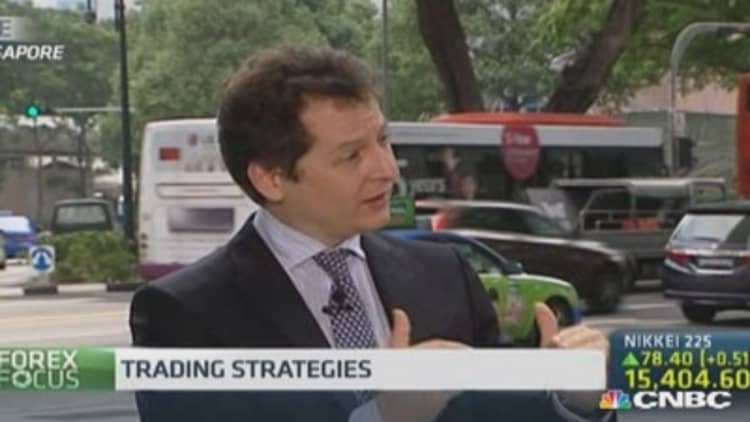This week has seen Hong Kong's first foreign exchange intervention in almost two years to curb currency strength and analysts expect more of the same in the weeks ahead.
That's because renewed optimism towards China's equity market and strong flows into Hong Kong's bond and stock markets should keep upward pressure on the Hong Kong dollar, they believe.
The Hong Kong Monetary Authority (HKMA), the city's de facto central bank, said on Wednesday it bought $2.1 billion over two days to contain gains in the local currency.
Read MoreWill 'Occupy Central' hurt Hong Kong?
It was the first official intervention since the fourth quarter of 2012.
"We think it was the first in what will prove to be another episode of concerted defense of the peg," said Tim Condon, head of research for Asia at ING Financial Markets.
"The intervention is noteworthy for what it says about the global investment climate. We attribute it principally to improved sentiment toward China having stoked risk appetites," he said in a note on Friday.
The Hong Kong dollar is pegged at 7.8 to the U.S. dollar, but can trade between 7.75 and 7.85. Under the currency peg, which has been in place since 1983, the HKMA is obliged to intervene when the Hong Kong dollar hits 7.75 or 7.85 to maintain the band.
Read MoreWill China reforms rejuvenate Hong Kong stocks?
The currency was trading at 7.7503 to the U.S. dollar on Friday.
China proxy
Hong Kong is often viewed as a proxy for China, so investors wanting exposure to the China trade often buy assets in Hong Kong first.
The has risen almost 3 percent over the past five days, outperforming a gain of nearly 2.6 percent in MSCI's broadest index of Asia-Pacific shares outside of Japan.
Read MoreWhat London can learn from Hong Kong housing
That comes amid signs that the Chinese economy is stabilizing thanks to mini stimulus measures from Beijing. Data earlier this week showed the official Purchasing Managers' Index (PMI) rising to 51 in June from 50.8 in May amid improving demand both at home and abroad.
Demand for the Hong Kong dollar has also been driven by a rise in corporate demand for commercial activities such as mergers and acquisitions, analysts say.
Jeffrey Halley, assistant vice president for currency trading, Asia-Pacific at Saxo Capital Markets, agreed that further intervention is likely.

"There was a huge amount of intervention this week and this is about people piling into bonds, stocks in a chase for yield," he said. "If you look at South Korea – there has been intervention there has well."
The South Korean won hit a six-year peak against the dollar this week and there has been suspected intervention in the currency markets to curb its strength, according to media reports.
Analysts said that while a strengthening in the Hong Kong dollar is often related to speculation that it's about to be de-pegged from the U.S. currency, its recent move reflected strong inflows.
Read MoreHundreds of thousands vote in HK democracy 'poll'
"The dollar has weakened because of the carry trade and a rise in risk appetite, but I don't think the HKMA will do much more [in terms of intervention]," said Nizam Idris, head of strategy for fixed income and currencies at Macquarie Bank.
If talk about U.S. monetary tightening sooner rather than later draws funds back into the greenback, strengthening pressure on the Hong Kong dollar and the HKMA to intervene should ebb, analysts said.
"Improved sentiment toward China and confidence-sensitive inflows into Hong Kong should force the HKMA into another sustained defense of 7.75, in essence a repeat of what happened in the fourth quarter of 2012," said Condon at ING. "We think the pressure will last until markets begin to reprice for the Fed's liftoff from zero [percent interest rates]."


